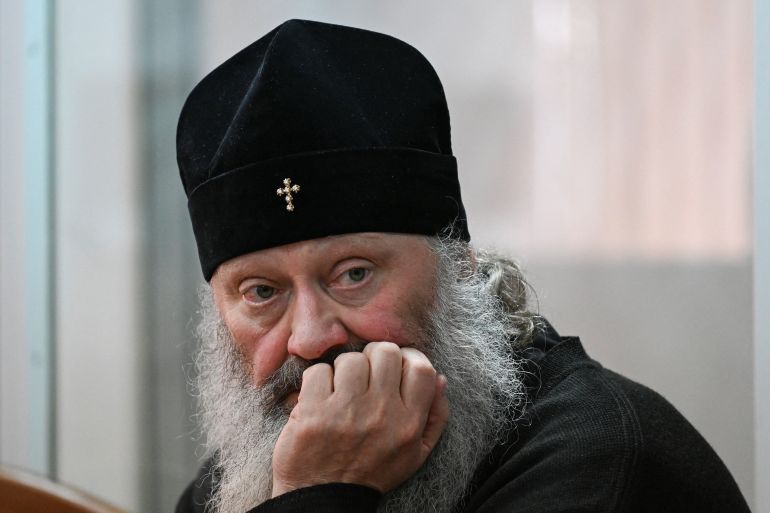Ukraine court puts Metropolitan Pavel under house arrest
Kyiv is cracking down on the Ukrainian Orthodox Church on the grounds it is pro-Russian and collaborating with Moscow, a charge the church denies.

A court in Ukraine’s capital has sentenced a top religious leader to house arrest, according to his church, amid hearings into whether he glorified invading Russian forces and stoked religious divisions.
In a statement on Saturday, the Ukrainian Orthodox Church (UOC) said the Kyiv court also ordered Metropolitan Pavel to wear an electronic bracelet.
Keep reading
list of 4 itemsUkraine accuses Orthodox leader of condoning Russia’s invasion
Russia-Ukraine war: Will there be a spring counteroffensive?
Russia-Ukraine war: List of key events, day 402
The Interfax Ukraine and Ukrinform news agencies said Pavel had been given 60 days of house arrest.
“I haven’t done anything. I believe this is a political order,” the religious leader told reporters after the ruling.
The decision came as Kyiv cracks down on the UOC on the grounds it is pro-Russian and is collaborating with Moscow, a charge the church denies. Earlier in the week, Pavel – who is the abbot of the Kyiv-Pechersk Lavra monastery, Ukraine’s most revered Orthodox site – had cursed Ukrainian President Volodymyr Zelenskyy, threatening him with damnation.
Prosecutors said the house arrest and electronic bracelet were precautionary measures, with prosecutor Yevhen Zavistovskyi saying that the case against Pavel would continue.
Russia’s TASS state news agency said the court ordered Pavel to live in a village some 40km (25 miles) southeast of Kyiv.
Pavel said the house was not fit for inhabitation.
“There is nothing to sleep on, no heat and no light. There is no kitchen, no spoon. But it’s OK, I’ll endure it all,” he said.
Pavel has been living in accommodation in the Kyiv-Pechersk Lavra, a 980-year-old monastery complex the government says the church must leave. TASS also said the court had denied Pavel permission to attend church services.
The UOC has insisted that it is loyal to Ukraine and has denounced the Russian invasion. But Ukrainian security agencies say some in the church have maintained close ties with Moscow.
The agencies have raided numerous holy sites of the church and then posted photos of roubles, Russian passports and leaflets with messages from the Moscow patriarch as proof that some church officials have been loyal to Russia.
Sixty-one UOC clergy have had criminal cases opened against them since the start of 2022 with seven found guilty.
The government had also ordered the monks at the Kyiv-Pechersk Lavrato to leave the compound by March 29. It claims they violated their lease by making alterations to the historic site, and other technical infractions. But the monks rejected the claim as a pretext.
Dozens of UOC supporters gathered outside the monastery on Saturday, singing hymns in the rain. A smaller group of protesters also turned up, accusing the other side of sympathising with Moscow.
“They wash the brains of people with Russian support, and they are very dangerous for Ukraine,” said Senia Kravchuk, a 38-year-old software developer from Kyiv. “They sing songs in support of Russia, and that’s horrible, here, in the centre of Kyiv.”
Third-year seminary student David, 21, disagreed.
Dressed in a priest’s robes and with a Ukrainian flag draped around his shoulders, he told The Associated Press news agency that the Lavra priests and residents were in no way pro-Russian. The state, he said, was trying to evict hundreds of people from Lavra without a court order.
“Look at me. I’m in priest’s clothes, with a Ukrainian flag and a cross around my neck. Could you say that I’m pro-Russian?” said David, who declined to give his last name because of the tensions surrounding the issue.
“The priests are currently singing a Ukrainian hymn, and they’re being called pro-Russian. Can you believe it?”
Separately, Ukraine’s president said on Saturday that he signed decrees to impose sanctions on more than 650 individuals and companies who he said “work for Russian aggression”.
Zelenskyy adviser Andriy Yermak said the list includes Russian state and local officials, “as well as enterprises engaged in the maintenance, repair or production of military equipment”.